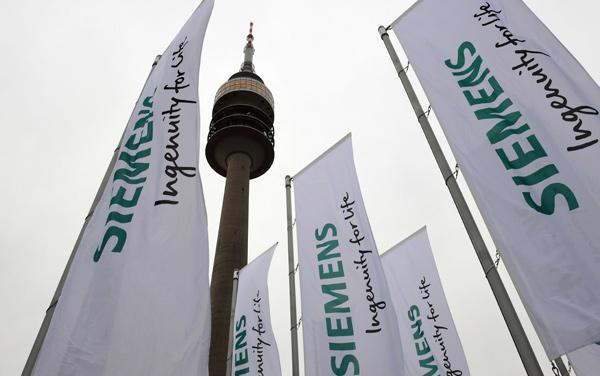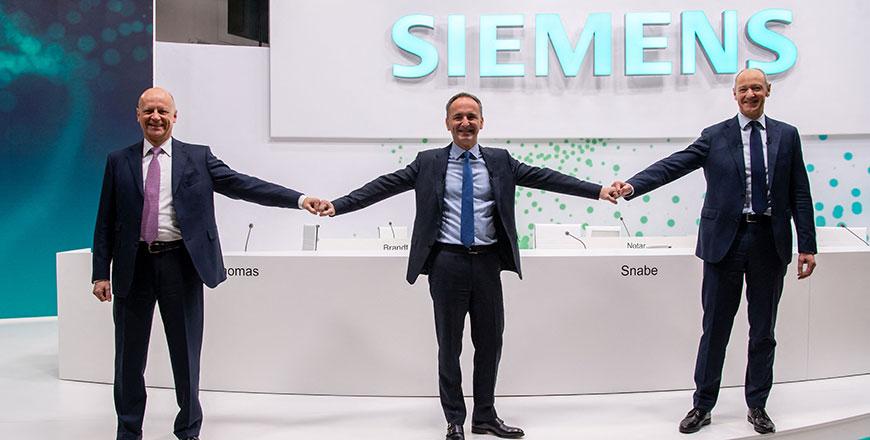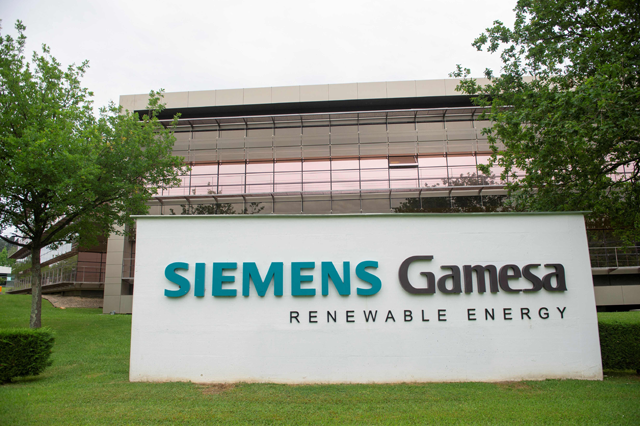You are here
Siemens’ energy unit spinoff lags expectations in market debut
By AFP - Sep 28,2020 - Last updated at Sep 28,2020

This photo shows the Chairman of of Siemens Energy Christian Bruch (left) and Ralf Thomas, CFO and board member of Siemens AG, next to the bull statue in front of the stock exchange in Frankfurt am Main, western Germany, where the initial public offer of Siemens Energy was launched on Monday (AFP photo)
FRANKFURT AM MAIN — German industrial giant Siemens on Monday spun off its energy division, with a below-expectations valuation of 16 billion euros, in one of the largest stock market debuts in Europe this year.
Shares in Siemens Energy traded at 22.01 euros ($23.27) at open, before sliding back to 21.68 euros at 08:34 GMT.
The valuation lagged expectations, with analysts having predicted the new company's market cap to reach between 17 billion and 24 billion euros. In March, Siemens said the energy unit had equity of about 17.3 billion euros.
"As an independent company, we now have the entrepreneurial flexibility we need to help shape the global transformation of the energy markets in a sustainable and economically successful manner," said Siemens Energy's Chief Executive Christian Bruch.
Despite the coronavirus pandemic upending business plans worldwide, Siemens pressed ahead with the spinoff first announced in May 2019.
Siemens Energy, with its oil and gas, turbines, power transmission and related services businesses, joins medical devices arm Healthineers and lightbulb unit Osram on the stock market, which debuted in 2018 and 2013 respectively, as Siemens slims down to become more agile.
Fleet of ships
In 2017, Siemens Chief Executive Joe Kaeser said he wanted the company to become a "fleet of ships" rather than an awkward tanker, as it seeks to chart a course through a more challenging time for industrial companies.
Other sprawling German conglomerates such as Thyssenkrupp, Bayer and Continental have similarly spun off units to face a fast-changing trade climate, digitalisation, and cheaper metal imports from China.
The energy unit, which employs 91,000 people, has struggled in recent years and last year announced 2,700 job cuts worldwide. It generated revenue of 28.8 billion euros in fiscal year 2019.
The conglomerate has, however, proved broadly resilient to the coronavirus pandemic, beating expectations with net profit of 539 million euros in the three months to the end of June.
As part of the spinoff, Siemens will give 55 per cent of shares in Siemens Energy to its current shareholders at a ratio of one Siemens Energy share for every two shares in the main company.
The company's pension fund will get 9.9 per cent, with the parent company holding on to 35.1 per cent.
After anticipating the share price to suffer a little at first, "in two to three weeks we will see the share price stabilise and towards December we will see the first fair valuation", Siemens chief financial officer Ralf Thomas indicated.
The shares had a "bumpy start" to trading, but the industry had "a promising future", Comdirect analyst Andreas Lipkow said.
Siemens intends to reduce its shareholding significantly within 12 to 18 months after the completion of the spinoff, it said.
Siemens Energy will own two-thirds of Spanish-based renewables arm Siemens Gamesa, as the company also pivots to more sustainable energy sources.
However, Siemens Group, which aims to be carbon neutral by 2030, recently come under fire for signing a contract in December to provide rail signalling services for the Carmichael coal mine project in Australia.
Luisa Neubauer, Germany's answer to Greta Thunberg and the leader of the country's Fridays for Future environmental protest, had turned down an offer to sit on the board of Siemens Energy after calling the Australia decision "disastrous".
In a peculiar quirk, the spinoff will temporarily raise Germany's blue-chip stock index to 31 names from its normal 30. Siemens Energy will drop off the DAX after close.
Related Articles
FRANKFURT AM MAIN — Industrial conglomerate Siemens said on Tuesday it would slash 2,700 jobs worldwide at its gas and power unit, including
FRANKFURT — German industrial company Siemens ploughed ahead in the first quarter, booking an increased net profit despite the supply chain
FRANKFURT — Siemens Energy reported a 4.59-billion-euro ($5-billion) annual loss on Wednesday, dragged down by a crisis in its wind power un














